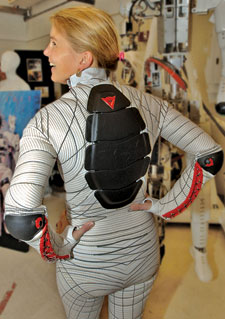Advertisement
Grab your lab coat. Let's get started
Welcome!
Welcome!
Create an account below to get 6 C&EN articles per month, receive newsletters and more - all free.
It seems this is your first time logging in online. Please enter the following information to continue.
As an ACS member you automatically get access to this site. All we need is few more details to create your reading experience.
Not you? Sign in with a different account.
Not you? Sign in with a different account.
ERROR 1
ERROR 1
ERROR 2
ERROR 2
ERROR 2
ERROR 2
ERROR 2
Password and Confirm password must match.
If you have an ACS member number, please enter it here so we can link this account to your membership. (optional)
ERROR 2
ACS values your privacy. By submitting your information, you are gaining access to C&EN and subscribing to our weekly newsletter. We use the information you provide to make your reading experience better, and we will never sell your data to third party members.
Environment
Newscripts
Space Fashion, Vitamin C Myths Debunked, Rare Species Found Alive
by Faith Hayden
July 30, 2007
| A version of this story appeared in
Volume 85, Issue 31

Space Fashion
Space suits aren't sexy. According to NASA, the current suit weighs 280 lb on the ground and is made up of 12 thick layers, including urethane-coated nylon, aluminized Mylar, and a combination of Gortex, Kevlar, and Nomex. Sounds comfortable.
In the 40 years humans have been traveling out of Earth's atmosphere, space fashion hasn't really changed. The suit leaves astronauts with limited mobility and, more important, without a waist or definition in their arms and legs.
Dava Newman and colleagues at Massachusetts Institute of Technology want to change that. For the past seven years, the team has been developing the BIOSUIT, a lightweight, skintight space suit designed to allow superior mobility.
Instead of using gas pressurization for protection, the BioSuit relies on the skintight fit to exert pressure on the astronaut's body. Unlike current space suits, small nicks to the BioSuit would not result in a lethal depressurization and could be repaired easily.
Newman expects the BioSuit to be ready within the next decade, right in time for our next trip to the moon.
Vitamin C Myths Debunked
It's probably happened to everyone at some point in their life: It's COLD SEASON, and you clean out the local pharmacy of its vitamin C supply. Two weeks later, you find yourself stuffy and congested.
Since the vitamin's discovery in the 1930s, controversy has surrounded its supposed ability to protect against the common cold. Nobel Prize-winning chemist Linus Pauling championed the vitamin in his 1970 book "Vitamin C and the Common Cold."
Now, according to an updated review of 30 vitamin C studies from the Australian National University and the University of Helsinki, in Finland, and published in Cochrane Database of Systematic Reviews, the vitamin won't help you out much, unless you run marathons.
Conducted over several decades and including more than 11,000 people who took daily doses of at least 200 mg, the review states that vitamin C does little to reduce the length or severity of a cold. However, researchers found that those people exposed to prolonged periods of high stress—such as marathon runners and skiers—were 50% less likely to catch a cold if they took vitamin C daily.
For the average person, the minimal benefit the vitamin gives isn't worth the expense, the researchers say. "It doesn't make sense to take vitamin C 365 days a year to lessen the chance of catching a cold," says coauthor Harri Hemilä, a professor at the University of Helsinki.
Vitamin C may not be a cure-all, but it's not useless, continues Hemilä. "Pauling was overly optimistic, but he wasn't completely wrong."
Rare Species Found Alive

There's a reason New Guinea is known as the "lost world." The island houses perhaps 5 to 10% of the world's total species, and a large number are still undiscovered. One species, however, has been rediscovered.
Attenborough's long-beaked echidna, Zaglossus attenboroughi, was last seen in 1961 when it was discovered in New Guinea by a Dutch botanist. Since then, scientists have not known whether the echidna was extinct or just hard to find due to the island's notoriously rough terrain.
To hunt down the RARE ECHIDNA, a team of experts from the Zoological Society of London traveled to the jungle-laden Cyclops Mountains. Seven local tribespeople claimed they saw the animal as recently as 2005, and one claimed to have eaten it, describing it as "delicious."
The team plans to return to the mountain range next year to carry out further research. No word on whether the locals plan on serving echidna enchiladas.
This week's column was written by Faith Hayden. Please send comments and suggestions to newscripts@acs.org.




Join the conversation
Contact the reporter
Submit a Letter to the Editor for publication
Engage with us on Twitter